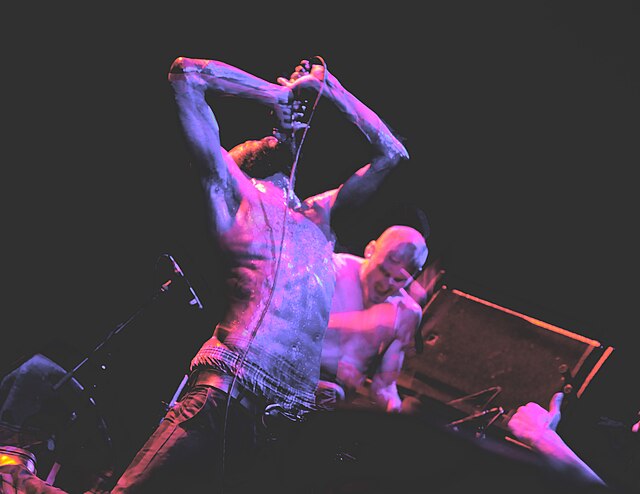
In his 1916 manifesto for the Dada art historical movement, Hugo Ball writes: “It’s a question of connections, and of loosening them up a bit to start with.” Dadaism is defined by this shattering of meaning and, like much of the early 20th century French avant-garde, seeks to dismantle the rigidity with which socially constructed normality imposes itself on art. In the 1924 manifesto of Surrealism, Andre Breton asserts, “we are still living under the reign of logic.” It is the didacticism of art which these avant garde practices contend with, seeking alternative modes of expression which concern themselves more with affect than rational construction of meaning.
It’s a question of connections, and of loosening them up a bit to start with.
This is the context in which I would like to discuss the band Death Grips, a contemporary example of a group who continue this project of the attack on meaning. Perhaps their best demonstration of how this mode of expression does not beget a lack of quality is the stunningly erratic and vibrant instrumentation in their catalogue. Music is perhaps the best medium for making this point because sounds have no inherent meaning. Unlike words, music can’t tell us to feel emotions, yet we do through the intangible magic of sonic frequencies.
In the context of Death Grips, there is a dual process occurring: both this de-signification of language through the Dadaist Surrealist tone of the lyrics, and the formal experimentation of the instrumentals. When the lead vocalist, known as Ride, yells, “My existence is a momentary lapse of reason, got the DNA of gothic lemons, shred it thirteen times out of eleven”, as on the song “Hacker;” or “I got tomorrow coming, in, in, in, in, in, Birds. F***k you”, as on “Birds,” he destroys signification and opens up the music to the realm of pure affect. The listener is no longer concerned with navigating the logical schemas of understanding art, but is free to be shocked and led by the violently unpredictable sounds.
The listener is no longer concerned with navigating the logical schemas of understanding art, but is free to be shocked and led by the violently unpredictable sounds.
That being said, there is a nonverbal logic to the band’s production—on songs like “Hot Head” and “Black Paint,” amid Ride’s nonsensical screaming of “Blow, blow, blow, blow, blow, blow, blow, hot head, oh no” and “I require privacy, I’m always thinking finally, dreaming, feigning,” there is a searing electric guitar riff which would not feel out of place in a globally celebrated classic by the likes of Nirvana or System of a Down. Death Grips are also superbly talented samplers, with songs like “Spread Eagle Across the Block” using Link Wray’s classic instrumental “Rumble” into an electric fusion of rock and hip-hop, and the entire album The Powers That B slicing up microscopic fragments of Björk vocals to masterful effect.
Overall, Death Grips are one of the most shocking yet beautiful members of the avant garde in the modern music industry. Their level of sonic experimentation will guarantee you a sound you have never heard anything remotely close to before, and their assault on structures of didactic art which perpetuate unoriginal, hegemonic products is inspiring.

